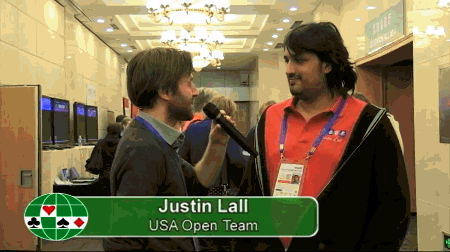Sunday, June 26, 2005
Constructive bidding is all about describing your hand until somebody can place the contract. You start with a very general description, like a 1![]() opener showing 5+ spades, 11-21 HCP, and then refine that description with each bid. Since you are refining your hand based on previous bids, you are stuck with your prior judgment of the hand. You cannot change your mind.
opener showing 5+ spades, 11-21 HCP, and then refine that description with each bid. Since you are refining your hand based on previous bids, you are stuck with your prior judgment of the hand. You cannot change your mind.
How often do you see people feeling guilty about having an exceptionally strong or weak hand for their bidding and trying to compensate? Often if someone has opened a 5-5 9 count they will refuse to cuebid later, even if the auction makes it mandatory. If you are guilty of this, you shouldn’t be opening these hands. Once you have decided your hand is an opening bid, you cannot later change your mind. It must be bid exactly as all minimum openers would be.
Similarly, if someone has a very good hand for their prior bidding he may feel compelled to bid again even if he was not invited to the party. There was an example of this on vugraph last night. A player who will remain anonymous held: ![]() K87
K87 ![]() AJT93
AJT93 ![]() 4
4 ![]() 9732 (spots approximated). His partner opened 1
9732 (spots approximated). His partner opened 1![]() , and he chose to give a simple raise to 2
, and he chose to give a simple raise to 2![]() . Not my choice, I think the hand is too good, but 2
. Not my choice, I think the hand is too good, but 2![]() was the bid he chose. His LHO competed to 3
was the bid he chose. His LHO competed to 3![]() and partner bid 3
and partner bid 3![]() . This bid is not invitational at all, it is purely competitive. It is anyone’s best guess what he has, but it doesn’t matter as you should always pass. Having bid 2
. This bid is not invitational at all, it is purely competitive. It is anyone’s best guess what he has, but it doesn’t matter as you should always pass. Having bid 2![]() , you must simply consider this hand a maximum. It will forever be considered a 2
, you must simply consider this hand a maximum. It will forever be considered a 2![]() bid (well, for this hand anyways). If partner wanted to be in game opposite a maximum hand, he could invite. When he doesn’t then a pass is in order.
bid (well, for this hand anyways). If partner wanted to be in game opposite a maximum hand, he could invite. When he doesn’t then a pass is in order.
You also see this when a player preempts an exceptionally good hand. Sure, if you are 6-6 and started with a preempt planning to bid again, that is different. Your plan all along was to operate (and if there is ever a time to do it, freak distribution is the best). But let’s say you have chosen a 2![]() opener with
opener with ![]() KQT942
KQT942 ![]() 2
2 ![]() AT83
AT83 ![]() 54 with nobody vulnerable. Maybe not your choice, certainly not mine. Partner raises to 3
54 with nobody vulnerable. Maybe not your choice, certainly not mine. Partner raises to 3![]() and RHO bids 4
and RHO bids 4![]() . Are you tempted to bid on? You should resist that temptation. Having opened with a preempt, you must simply consider this a maximum preempt. Partner is in control and you can not bid again (unless that was your plan the whole time with a wildly distributional hand). He may have a doubleton spade and good defense, hoping to push them too high. He may have 4 small spades and out, hoping to keep them out of slam. He may have anything. You have shown a preempt and are stuck with that evaluation.
. Are you tempted to bid on? You should resist that temptation. Having opened with a preempt, you must simply consider this a maximum preempt. Partner is in control and you can not bid again (unless that was your plan the whole time with a wildly distributional hand). He may have a doubleton spade and good defense, hoping to push them too high. He may have 4 small spades and out, hoping to keep them out of slam. He may have anything. You have shown a preempt and are stuck with that evaluation.
The point of all this is that you must bid your hand in a consistent manner. If you do not, intelligent partnership bidding will simply be impossible.
Esta entrada también está disponible en: Spanish

